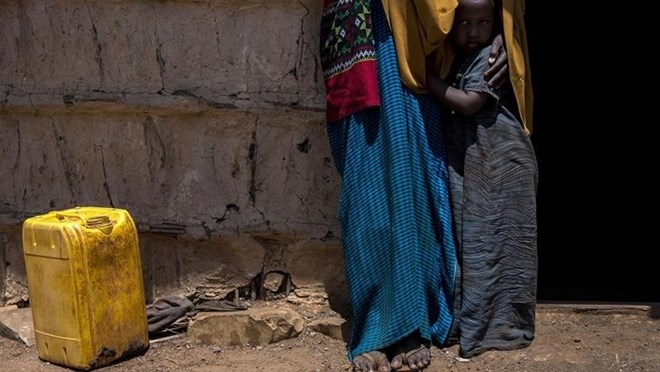
Mohammed Dhaysane
Saturday August 27, 2022

Somalia, the most climate change-affected country in the Horn of Africa, is facing a catastrophic drought that has already claimed hundreds of lives.
Baidoa, the capital of Southwest State, hosts thousands of new arrivals from rural areas after the drought devastated their farms and livestock, some of them walking as much as 180 kilometers (112 miles) to reach major towns to receive humanitarian assistance.
Nuurto Abdi Hilowle, 35, a mother of four, arrived in Baidoa four months ago but hasn’t received any humanitarian assistance so far.
She told Anadolu Agency at an internally displaced persons (IDP) camp on the outskirts of the city that her four children and she hadn’t eaten for more than 48 hours. She said they had been eating leftovers to survive, but there are no more.
“After eating only leftovers for days and with my children starting to weaken from malnutrition, I had no choice but to steal and sometimes resort to begging, because a mother would do everything to feed her young,” she said.
She is not alone. Suuban Ali is one of those devastated by the drought. She is now at the Sumadle IDP camp in Baidoa, joining hundreds of displaced families. She told Anadolu Agency she fled from a small village on the outskirts of the town of Wajid in the Bakool region.
She and her children along with several other families walked more than 90 kilometers (56 miles) to get to Baidoa without having food or water.
She said that after walking for nearly two days, they couldn’t travel much further due to hunger and thirst.
“Although the distance was only 90 kilometers, it took us almost a week to come here. But after more than a week being here and getting nothing other than leftovers, I’m thinking of eating animal skin to survive.”
Abukar Abdi Adan also joined the IDP camp, arriving four days ago from Buur Eyle. He is a member of the marginalized Eyle community. He told Anadolu Agency that the drought has also affected wildlife.
“I was a hunter and gather, but there is nothing left to hunt because this drought killed everything. I decided to join the people who are dependent on humanitarian assistance here,” he said.
More than 20 new IDP camps have been set up in Baidoa as families fleeing from the drought are coming to the city in their thousands.
Authorities in Baidoa told Anadolu Agency the drought is not the only reason behind the surge in displacements. Insecurity and extortion by the al-Shabaab terrorist organization are also among the reasons for the influx of displaced people.
Appeal
The United Nations Refugee Agency (UNHCR) has appealed for $9.8 million to address the growing child protection needs in Somalia.
The UNHCR estimates that 2.3 million girls and boys are at imminent risk of violence, exploitation, abuse, neglect and death from severe acute malnutrition as a result of a food and nutrition crisis across the country.
"There is an urgent need to ensure that children's specific needs are taken into account with both standalone actions and enhanced mainstreaming and integration efforts," the UN said earlier this week.
The UN agency said it has prioritized the protection of 332,200 girls and boys across 37 districts through standalone actions and enhanced mainstreaming and integration efforts to respond to the drought and prevent famine-related child protection risks.
People in need of humanitarian assistance
According to the UN, over 7.7 million people -- close to half the country’s population of nearly 17 million -- had been affected by the severe drought as of last month.
An estimated 1 million people have been displaced from their homes due to drought, of whom 66% are children.
Authorities in Somalia’s Gedo region told media that drought-related illnesses have caused the deaths of more than 50 people there.
Ali Yussuf, spokesman for the Gedo regional administration, told Anadolu Agency that the deaths occurred in the border town of Beled Hawo and Baardheere area.
“We know that 50 people -- mainly children, women and the elderly -- have died due to malnutrition and drought-related illnesses recently. The Gedo region is facing an unprecedented drought that needs more attention. Otherwise, the situation might be catastrophic in the coming days, weeks or months if the humanitarian assistance is not scaled up,” he told Anadolu Agency.
The UN Children’s Fund (UNICEF) recently announced that 500 children had died from malnutrition in Somalia since January.